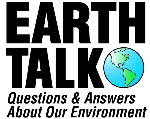Sustainable: What does it mean?EARTH TALK Dear EarthTalk: The term “sustainable” seems to be the new green buzzword. What exactly does it mean, particularly when applied to such things, say, as transportation or agriculture?
-- Steve Nezhad, Portland, ME “Sustainable,” quite simply, is the positive result of conducting economic, social or environmental activities in such a way that current needs are met without compromising the well-being of future generations. A sustainable activity also does not despoil the here and now, in part because of how it may affect the future.
For example, cars that run on oil and gasoline are unsustainable on both counts: They make use of a non-renewable resource (that is, one that will be completely depleted at some point in the future); and they pollute the environment right now. Thus they negatively impact the present-day as well as tomorrow.
What, then, is sustainable transportation? Any option that moves people or goods while impacting the environment minimally. Walking and bicycling are the most sustainable, using no energy except for leg power and consuming very little or no resources. And public transportation moves large numbers of people at once while also saving space, as one negative impact of cars is that activities tend to spread out through the process of sprawl, creating the need to travel greater distances to obtain goods or get to work.
As such, to a large extent transportation can be made more sustainable through urban design. The closer together we locate shopping and entertainment centers, the easier it is for public transport to get us there, and the less reliant we are on cars. And cars themselves can be more sustainable by running on clean fuels or on technologies, like hybrids, that use less fuel. Better yet, cars of the not-too-distant future will be powered by fuel cells, which run on hydrogen and spew no pollution. Ideally, that hydrogen will be made from water, using power from solar energy, thus creating no pollution at that point in the process, either.
In the realm of farming, sustainable agriculture in its ideal form provides a living for those who farm and supports the local community’s needs while maintaining the natural ecology of the farm and its surrounding environment. According to the National Safety Center (NSC), a “sustainable” farm produces crops without damage to the farm’s ecosystem, including the soil, water supplies and other adjoining resources. Sustainable agriculture is also “intergenerational,” says NSC, in that it seeks to pass on to future generations a conserved natural resource instead of one that has been depleted or polluted. Some examples of sustainable agriculture include avoiding chemicals, rotating crops, and choosing crops that suit the climate, so as to reduce the need for chemicals and preserve the long-term fertility of the soil. In light of modern developments, some might add that avoiding genetically modified crops would also fit with the sustainable model, given the uncertainty of their impact on ecosystems and personal health.
Robert Gilman of the Context Institute defines sustainability as “extending the Golden Rule through time…Do unto future generations as you would have them do unto you.” Meanwhile, Paul Hawken of the Natural Capital Institute offers an equally concise summary: “Leave the world better than you found it, take no more than you need, try not to harm life or the environment, make amends if you do.”  CONTACTS: Context Institute, www.context.org; Natural Capital Institute, www.naturalcapital.org CONTACTS: Context Institute, www.context.org; Natural Capital Institute, www.naturalcapital.org
GOT AN ENVIRONMENTAL QUESTION? Send it to: EarthTalk, c/o E/The Environmental Magazine, P.O. Box 5098, Westport, CT 06881 USA; submit it at: www.emagazine.com/earthtalk/thisweek/; or e-mail: earthtalk@emagazine.com .
| 